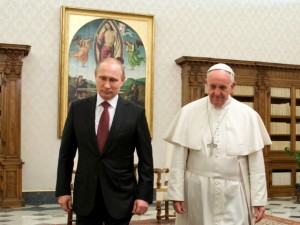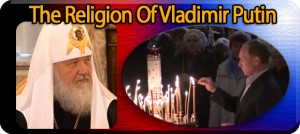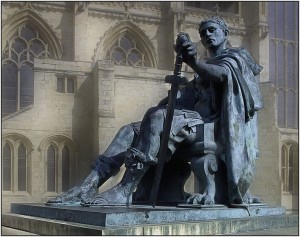[Editor’s note: we know that there are very strong opinions on the other side and we are willing to publish the contrary view]
 Diversionary foreign policy, and/or wars intended for diversion, are old tactics instigated by governments to distract people from domestic problems. Recent Western policy in promoting the overthrow of the elected Ukrainian President, Viktor Yanukovych, has yielded two such diversions.
Diversionary foreign policy, and/or wars intended for diversion, are old tactics instigated by governments to distract people from domestic problems. Recent Western policy in promoting the overthrow of the elected Ukrainian President, Viktor Yanukovych, has yielded two such diversions.
First, the attempt to move Kiev closer to NATO politically, and closer economically to the European Union, has polarized Ukrainians. Secessionism in the eastern Ukraine and in Crimea quickly degenerated into an international quarrel with Russia, one of the world’s nuclear powers. Opportunistically, this conflict was adapted into an West vs. East — Barack Obama vs. Vladimir Putin — distraction from centrifugal forces undermining EU unity. Drums of war drown out voices of dissent.
A second diversion derives from the polarizing of East and West. With military maneuvers by NATO and by Russia, any dispassionate consideration of Putin’s moral and religious initiatives gets squelched in nationalistic fervor. He is seen, therefore, in the most negative rendering of a Russian leader since the Cold War. Prince Charles compares Putin to Hitler, while Sen. John McCain harangues us about the threat of a new Soviet empire. A host of columnists like Owen Matthews inflame public opinion with themes like this: “Vladimir Putin’s new plan for world domination: After Sochi and Crimea, the world.”
Except via military alliance with China, Russia’s armed forces lack the capacity to take over Eurasia, much less the world. Even to defeat NATO in Europe would be exceedingly problematic. Vladimir Putin is savvy enough to see the limitations of his war machine, although realistically he may look to boost Russia’s regional power and global importance by restoring former spheres of influence.
But for us as spiritually-minded citizens, no international rivalries are nearly so pressing as what is generally described as the culture war, the unrelenting attacks on religion and morality. These are, as George Washington is oft quoted, the “firmest props of the duties of men and citizens.”[1] Or as the Emperor Constantine wrote just prior to the Council of Nicaea:
Strive, under God, to see “the serpent driven
from the administration of public affairs.”[2]
But the political policies of every Christian leader since Constantine the Great have been considered by some historians, and later by mainstream media, in terms of secular motives exclusively. They are like researchers locked in the box of scientism, routinely dismissing all evidence that is not empirically verifiable in the material realm. Likewise, secularist reporters habitually take religious motivation and depict it in the secular terms with which they are comfortable.
We should hardly be surprised, then, when they portray Putin as motivated more by political expediency than genuine love for the Gospel. Cynical historians will also bring up Stalin the tyrant, and his pragmatic alliance with Russian Orthodoxy in response to the Nazi invasion – une politique désespérée – as analogous to Putin’s new found religiosity.
Admittedly, one can hardly be sure about any leader in public life who is so far removed from personal contact. Unlike George W. Bush in 2001, ordinary citizens cannot look into Putin’s eyes and “get a sense of his soul.” Still, although not absolutely compelling, a story is certainly endearing that just before Putin departed for a diplomatic trip to Israel, his mother, Maria Shelomova Putina, gave him a baptismal cross. He said of the occasion: “I did as she said and then put the cross around my neck. I have never taken it off since.”[3]
Writing in Decision Magazine (March 2014) the American clergyman, Franklin Graham (Billy’s son), puts more stock in Putin’s works:
In my opinion, Putin is right on these issues. Obviously, he may be wrong about many things, but he has taken a stand to protect his nation’s children from the damaging effects of any gay and lesbian agenda.
Our president and his attorney general have turned their backs on God and His standards, and many in the Congress are following the administration’s lead. This is shameful.
The world used to look to America for moral leadership. But those days are long gone.
Today, we’ve abdicated our moral leadership. We defeated communism, only to relax and see secularism and progressives take over our country. Secularism is as godless as communism. Secularists and progressives have taken over our schools, media, and local and federal government. And it has all happened in the twinkling of an eye.
 Honesty as well as realism requires that Putin’s campaign for traditional morality, and indeed the near opposite in America, ought to be seen as deeper phenomena than mere slight-of-hand attempts to rally political supporters and to secure international advantage. Instead, I submit, we should take principles which Putin is attempting to advance and evaluate their intrinsic spiritual merit:
Honesty as well as realism requires that Putin’s campaign for traditional morality, and indeed the near opposite in America, ought to be seen as deeper phenomena than mere slight-of-hand attempts to rally political supporters and to secure international advantage. Instead, I submit, we should take principles which Putin is attempting to advance and evaluate their intrinsic spiritual merit:
Today, many nations are revising their moral values and ethical norms, eroding ethnic traditions and differences between peoples and cultures. Society is now required not only to recognize everyone’s right to the freedom of consciousness, political views and privacy, but also to accept without question the equality of good and evil,… (Putin, December 2013)[4]
Asked by Time magazine in 2007, what role faith plays in his leadership, Putin replied:
First and foremost, we should be governed by common sense. But common sense should be based on moral principles first. And it is not possible today to have morality separated from religious values,…[5]
By contrast, observe Sen. Mark Kirk of Illinois (R), a Congregationalist Protestant who votes liberal on social issues. Earlier this month he admitted privately to putting the USA before and in front of God, specifically on the moral issue of abortion.[6] For Sen. Kirk what matters most is not whether Putin is an ally of Christians fighting the global culture war, but whether “Vladimir Putin’s goal is to re-create the Soviet empire.”
Who but a progressive Western leader like Kirk, or some indiscriminate secularist, would want a statesman who promotes the Gospel in Russia to get much the same sanctions as the Iranian regime?[7] For Kirk and his ilk, the overriding factor is that Putin happens to be an adversarial relationship with the geopolitical strategists in D.C. and in NATO.
Kirk’s perspective is that of an obtuse spirit, aiming to discredit the foremost nation currently resisting the trends toward practical atheism. Russia under Putin’s leadership has refused to go along with the pagan cultural agenda. Quite the opposite, insofar as Christianity is making a dramatic comeback there.
It must be high on Satan’s agenda, therefore, that Russia’s leader be vilified, lest he lead world opinion in a turnabout contrary to postmodern trends. The Father of Lies and his minions portray Putin as a villain so that his power to persuade might lessen, rendering his pro-Christian positions less influential on abortion, secularism, and the cultural mainstreaming of unnatural vice.
Another prevarication leveled at Putin is that he is casting himself in Uncle Joe’s mold. Look, however, at the differences. Joe Stalin, the Russian tyrant, was under 60 before he won the Second World War and occupied the six Warsaw Pact nations – the most westerly advance of the evil empire into Europe. At 61 Putin is starting late, and by comparison his territorial advances are few. He has reacquired Crimea, has occupied a northern slice of Georgia, and would like to see Eastern Ukraine back in the Russian sphere of influence.
Another contrast with Stalin’s conquests is that the reannexation of Crimea was jubilantly welcomed by most Crimeans, very much in contrast to Eastern Europe after WW II. Faced with Soviet occupation, Poles, Czechs, East Germans, Hungarians, Bulgarians, and Rumanians were anything but jubilant as the USSR whipped them into submission.
Within Crimea itself the contrast with Stalin’s government is stark. In 1944 Stalin had the Tatars from Crimea deported en mass, relocating them in Siberia. But last month, Russia having regained control of the Crimea, Putin ordered the Tatars rehabilitated.
In liquidating as many as six million Kulaks in the 1930’s,[8] Stalin ranks alongside Hitler as the perpetrator of unparalleled crimes against humanity. Stalin maintained also the Gulag Archipelago, immortalized in infamy by Alexander Solzhenitsyn.
Proportionate to the millions sent to the Gulag, often never to return; Putin’s oppressive measures against dissenters are minuscule by comparison. How indignant must be surviving Gulag inmates, now that Russian courts jailed for 22 months part of the pro-gay hooligan band, Pussy Riot, after their performance profaning a Church!
During the greater part of his third-of-a-century in power, Stalin murdered and otherwise persecuted Christians. By contrast, Putin facilitates Christianity, opens political doors, and helps the Russian Orthodox Church play a more active role in the public square, including public schools.
Perhaps the most poignant symbol of Russia’s return to her spiritual roots took place during Putin’s first term as President. With private contributions backed by government matching funds, the Russian Orthodox “Church on the Blood” was built in Yekaterinburg, at the very site where the Bolsheviks murdered the Tsar and his family in 1918. The architects placed the high altar over the exact spot where the bullet-riddled body of Tsar Nicholas II was found.
So much, then, for critics who link Putin’s policies to Stalin’s. A closer comparison would be Francisco Franco of Spain; or, perhaps more agreeable to Russian sensibilities, Constantine I, whom Eastern Orthodox Churches have for centuries recognized as a saint. Like Constantine, both Franco and Putin qualify as crusaders, although Putin’s pro-Christian policies have yet to assume a military aspect.
In 1936 Spain entered into a civil war which historian Warren Carroll entitles The Last Crusade. General Franco was 44, seventeen years younger than Putin today. But Franco lived for another 39 years. During more than three decades of dictatorship, he freed the Catholic Church in Spain from horrendous persecutions by the Soviet-backed Republic; he restored Catholic education in the public schools; and he allied himself with the Church in her role of upholding public morals. Like Putin he was both autocratic and pro-Christian in policy. But unlike Putin, Franco had virtually no constitutional or parliamentary limitations on his government.
Constantine the Great is ranked as “one of the most successful political and military leaders, and one of the most influential religious and cultural figures in world history.”[9] In the 4th century (312 and 324, AD) he inflicted crushing military defeats on his pagan imperial rivals, Maxentius and Licinius — somewhat like Franco’s annihilation of the pro-Stalinist forces of the Spanish Republic. Constantine inaugurated an enduring political/cultural revolution with the Gospel as its presiding paradigm.
Like Putin today, the contemporaries who hated Constantine accused him of siding with Christianity as a cynical and calculating political move. To the contrary, however, my own studies, as well as most scholarly works I’ve cited there, indicate that the Emperor Constantine was a sincere Catholic who became more openly religious as he grew older, especially after he consolidated power throughout the Roman world in 324.[10] Also he tried to upgrade morals and was personally revolted by sodomy, suppressing it much more proactively[11] than anything in Putin’s pro-family policies.[12]
Unlike Franco’s counterrevolution against pagan Republicanism, however, Constantine’s theocracy survived him, continuing in the Byzantine Empire for another eleven centuries – the most long-lasting Christian empire in the annals of history. How many years the blessing of Orthodox restoration in Russia will outlast Putin remains to be seen. Hopefully there will be no apostasy comparable to what has afflicted Spain since Franco, or America since JFK.
_____
The assassination of America’s President happened approximately as SCOTUS was battering down the gates in a coup d’état against our Judeo-Christian Republic. The year 1963 witnessed a great deal of worldwide woe. Most tragically, it inaugurated permanent revolution with a vengeance – a radical transformation that, for want of better words, we can term the postmodern revolution.
I have no Mirror of Galadriel that can see into the future of either Russia, Spain or postmodern America. What is crystal clear about present trends is this: revolutionary change in an anti-Christian direction is characterizing both Spain and the USA; whereas, under Putin, Russia is experiencing a counterrevolution, a U-turn back toward Judeo-Christian civilization.[13]
Since the apparitions at Fatima in 1917, Catholics have been praying for the conversion of Russia. Why be bewildered if our prayers are being answered? Is it not providential that the Russian counterrevolution against Bolshevist atheism is bearing good spiritual fruit?
Pat Buchanan portrays the trends as follows:
As the decisive struggle in the second half of the 20th century was vertical, East vs. West, the 21st century struggle may be horizontal, with conservatives and traditionalists in every country arrayed against the militant secularism of a multicultural and transnational elite.
He (Putin) is seeking to redefine the “Us vs. Them” world conflict of the future as one in which conservatives, traditionalists and nationalists of all continents and countries stand up against the cultural and ideological imperialism of what he sees as a decadent west.
The adversary he has identified is not the America we grew up in, but the America we live in, which Putin sees as pagan and wildly progressive.
Putin is the anti-Obama, moving to occupy the cultural-moral vacuum left by America. As we celebrate multiculturalism, LGBT rights, and abortion on demand, Putin repudiates Hollywood values.[14]
Vladimir the Inscrutable is much like his country (in Churchill’s phrase): “a riddle wrapped in a mystery inside an enigma.” But under all the mystery there has to be some substance to his character. Philosophically he seems to lean toward the slavophiles.[15]
Hopefully the President of Russia — with a nuclear arsenal of 1512 warheads deployed — has more scruples in his soul than did Pres. Harry Truman, who used weapons of mass destruction against civilian populations. Perhaps Putin is something like Constantine, the religious liberator, combined with Francisco Franco, the Caudillo, immersed in a Russian Orthodox gel and spiced with a dash of “managed democracy.” Such a person might be saluted (not savaged), and most assuredly he needs our prayers.
ENDNOTES
[1] Excerpt from Washington’s Farewell Address, September, 1796: “Of all the dispositions and habits which lead to political prosperity, religion and morality are indispensable supports. In vain would that man claim the tribute of patriotism, who should labor to subvert these great pillars of human happiness, these firmest props of the duties of men and citizens. The mere politician, equally with the pious man, ought to respect and to cherish them. A volume could not trace all their connections with private and public felicity.”
[2] Charles M. Odahl, Constantine and the Christian Empire (New York: Routledge, 2013), p. 186; cf. endnote 37. Odahl quotes from Constantine’s letter to Bishop Eusebius of Caesarea in the winter of 324-25, the text of which Eusebius included in his Life of Constantine 2.46.
[4] See appendix below.
[6] Brian Kemper, “What Would You Say if You Sat Next to a Pro-Abortion U.S. Senator on a Plane? Here’s What I Did.” http://catholicnewslive.com/story/134230, 5/9/14.
[8] The six million estimate is Alexander Solzhenitsyn’s.
[9] Odahl, supra, p, 287. According to Odahl, pagan and Christian writers alike compared Constantine favorably with Alexander the Great, Scipio Africanus, Julius Caesar, Trajan, and the “good emperors.”
[10] Ibid., pp. 285-287.
[11] Eusebius Life of Constantine 4.25.
[12] “Putin: Russia must ‘cleanse’ itself of homosexuality,” CBS News, 1/19/2014.
[13] “Putin in Passover greeting: Russian Jews make huge contribution,” Global Jewish News Source, 4/17/14.
[14] Pat Buchanan: “Is Putin One of Us?” Townhall 12/17/13; “The Specter Haunting Europe,” 5/23/14.
[15] It is reported that Putin ordered Russia’s regional governors to read three weighty books by 19th and 20th century Russian philosophers. The books are The Philosophy of Inequality by Nikolai Berdyaev; Justification of the Good by Vladimir Solovyov and Our Tasks by Ivan Ilyin. Putin has quoted from these slavophile philosophers a number of times in recent speeches.
APPENDIX
Excerpt from Putin’s Address to the Federal Assembly, The Kremlin, Moscow, 12/12/13.
“Today, many nations are revising their moral values and ethical norms, eroding ethnic traditions and differences between peoples and cultures. Society is now required not only to recognise everyone’s right to the freedom of consciousness, political views and privacy, but also to accept without question the equality of good and evil, strange as it seems, concepts that are opposite in meaning. This destruction of traditional values from above not only leads to negative consequences for society, but is also essentially anti-democratic, since it is carried out on the basis of abstract, speculative ideas, contrary to the will of the majority, which does not accept the changes occurring or the proposed revision of values.
“We know that there are more and more people in the world who support our position on defending traditional values that have made up the spiritual and moral foundation of civilisation in every nation for thousands of years: the values of traditional families, real human life, including religious life, not just material existence but also spirituality, the values of humanism and global diversity.
“Of course, this is a conservative position. But speaking in the words of Nikolai Berdyaev, the point of conservatism is not that it prevents movement forward and upward, but that it prevents movement backward and downward, into chaotic darkness and a return to a primitive state.”




